The underwater world is a place filled with fascinating mysteries and is home to a wide variety of amazing creatures. Even though we typically identify intelligence with mammals and birds, the waters are home to a wide variety of fish species that confound our preconceptions about intelligence.
These amazing aquatic creatures have cognitive capacities that make it difficult for us to grasp the animal realm. These fish species show that the ocean’s depths hide a treasure trove of astounding intelligence, from problem-solving and communication to memory retention and even cooperation.
The fascinating realm of aquatic intelligence and cognitive capability will be revealed as we investigate 10 Fish Species That Possess Brains in this article.
The Basics of Fish Brains
Despite being smaller than some mammal brains, fish brains are extremely tuned to fulfill their particular needs underwater. Similar to other animals, a fish’s nervous system is controlled by its brain, which is also in charge of processing information, making decisions, and coordinating numerous bodily activities. But unlike their terrestrial counterparts, fish brains have evolved with distinctive characteristics that set them different.
Comparative Brain Size
Fish come in a variety of sizes when it comes to their brains. While some creatures have remarkably small brains compared to their bodily size, others have surprisingly huge ones. For instance, because of their predatory lifestyle and need for advanced sensory processing, bigger fish, like sharks, have brains that are more substantial in both size and complexity.
lesser fish, like some tropical species, may have lesser brains than larger fish, yet they are equally adapted to their particular surroundings. These species are able to thrive in their individual habitats because their brain size is tailored to the particular ecological niche they occupy.
Complexity of Fish Brains
Despite the size differences, fish brains exhibit a remarkable level of complexity. They have evolved specialized adaptations to cope with the challenges of life underwater. These adaptations enable them to navigate, communicate, hunt for prey, and evade predators effectively.
One of the fascinating aspects of fish brain complexity is their sensory processing. Many species rely on specialized organs to detect subtle changes in the aquatic environment. For example, electric fish have evolved electroreceptive organs that allow them to sense electrical signals produced by other living organisms, aiding in navigation and communication.
Specialized Adaptations
Fish have developed unique brain adaptations that align with their specific ecological roles and behavioral strategies.
Some of these specialized adaptations include:
Sensory Enhancements
Numerous fish species have improved sensory capacities. For example, species that live in muddy environments may have larger olfactory bulbs to better pick up chemical clues. Others may have highly developed lateral lines, which improve their ability to navigate and find prey by allowing them to feel vibrations and pressure changes in the water.
Environmental Memory
Some fish have remarkable spatial memory, which enables them to find their way through intricate underwater labyrinths and return to particular places, such as breeding grounds or protected zones. For survival and a healthy reproductive process, it is essential to be able to recall and recognize familiar situations.
Camouflage and Mimicry
Some fish have developed brain structures that allow them to quickly change their color and pattern, effectively blending into their surroundings. Some creatures have also mastered the art of mimicry, impersonating other living things to fool predators or potential prey.
Organ Electric Discharge
Like the electric eel, electric fish have unique brain regions that regulate the production and discharge of electric signals. These signals are used for a variety of functions, including communication, navigation, and hunting, displaying an astonishing level of adaptability to life in the electrically conductive waters of their environments.
Advanced Hunting Methods
Fish that are predators frequently engage in intricate hunting activities that call for careful timing and coordination. They can successfully hunt using tactics including ambushes, group hunts, and precise strikes because to their highly developed brains.
10 Fish Species That Possess Brains
Fish, with their astonishing array of adaptations to the aquatic environment, continue to captivate scientists and enthusiasts alike. Among the many intriguing features these underwater denizens possess, their brains stand out as remarkable centers of intelligence and problem-solving abilities.
The Atlantic Salmon
The Atlantic Salmon (Salmo salar) is well known for both its extraordinary cognitive powers and its spectacular migratory achievements.
These fish travel thousands of kilometers during their migration in order to return to their birthplace for spawning. Being one of the most outstanding migratory species in the animal kingdom, they are able to find their way back with amazing precision thanks to their incredible spatial memory.
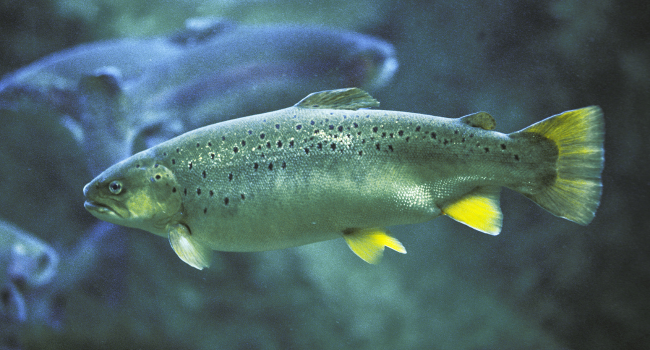
The Mantis Shrimp
One of all animals with the most advanced visual systems is the mantis shrimp (Stomatopoda). Due to the extraordinary amount of photoreceptor cells in their eyes, they are able to see a wide variety of hues, including ultraviolet and polarized light.
The processing of this visual data by the Mantis Shrimp’s brain gives them an unmatched perception of their colorful underwater environment.
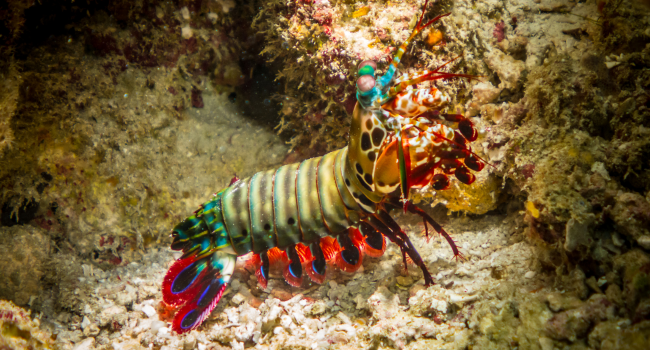
The Archerfish
A true marksman of the sea is the archerfish (Toxotidae). It shoots down insects above the water’s surface by spitting water jets with great accuracy, using its specialized mouth and brain.
The Archerfish adjusts the angle and speed of its water jets to strike its prey precisely, demonstrating its impressive problem-solving abilities.
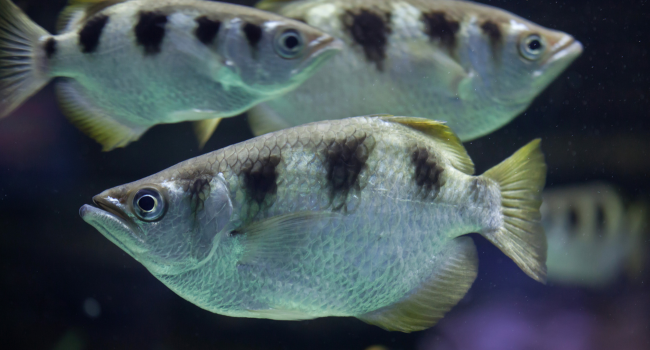
The Bottlenose Dolphin
The brain of the playful and highly intelligent bottlenose dolphin (Tursiops truncatus) is both complex and highly evolved.
These marine animals have highly developed cognitive capacities, including those for problem-solving, tool use, and complex vocalizations. The brain of the bottlenose dolphin enables it to understand the social dynamics of its pod and to engage in complex hunting techniques.
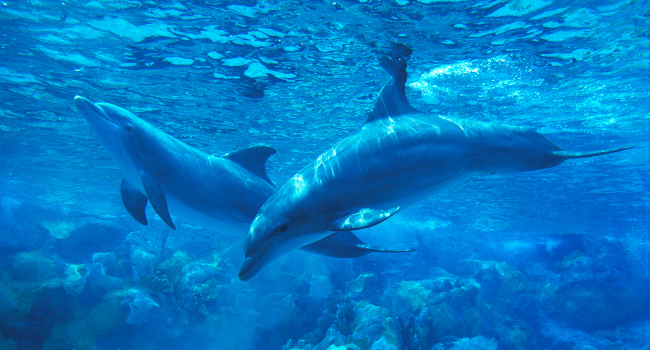
The European Stickleback
Despite having a relatively small brain, the European Stickleback (Gasterosteus aculeatus) has earned a spot among fish with exceptional brains.
The brains of these sticklebacks undergo major modifications when they move between freshwater and saltwater settings throughout their life cycle, according to research. The ability of the European Stickleback to adapt and prosper in various environments is highlighted by this versatility.
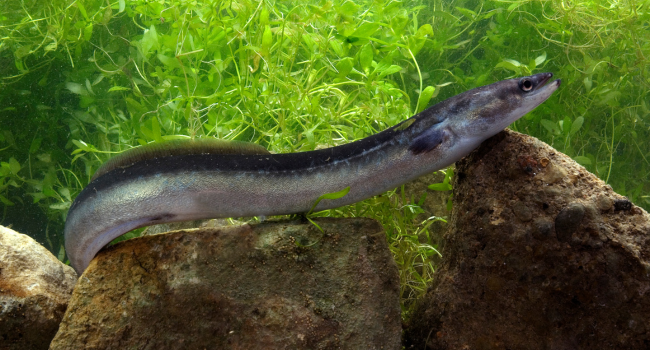
The Sheephead of California
More than other fish its size, the California Sheephead (Semicossyphus pulcher) has a larger brain. Because of their outstanding problem-solving skills and larger brains, California Sheepheads can get food that is tucked away in tricky environments, such sea urchins hidden among rocks.
The Cleaner Wrasse
The Cleaner Wrasse (Labroides spp.) is a master of social intelligence. These small fish have developed a unique symbiotic relationship with other species.
Their specialized brain enables them to identify “client” fish that need cleaning and remove parasites, showcasing their ability to comprehend and engage in cooperative behavior.
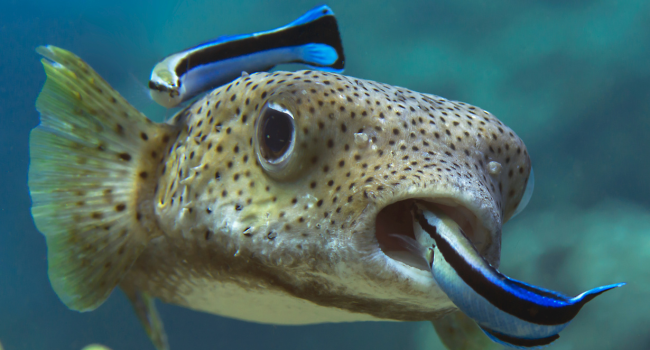
The Port Jackson Shark
The Port Jackson Shark (Heterodontus portusjacksoni) is known for its intriguing cognitive abilities, including spatial memory. This shark can remember safe paths through complex underwater environments, allowing it to navigate effectively and find its way back to familiar locations even after long migrations.
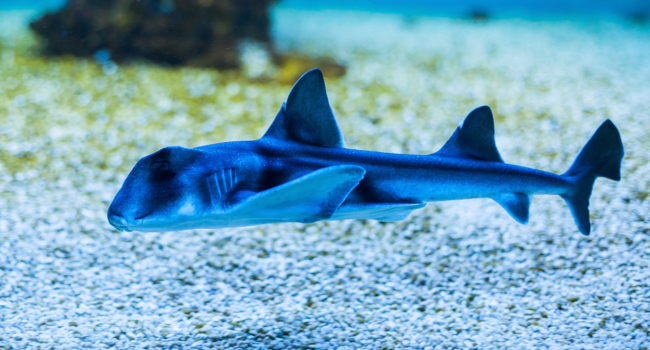
The Octopus
One of the ocean’s most intelligent and adaptable species is the octopus (Octopoda). The octopus has a brain that is dispersed throughout its body and extends into its tentacles, which allows it to function with unmatched memory, adaptability, and problem-solving abilities. It excels as a predator and escape artist thanks to these characteristics.
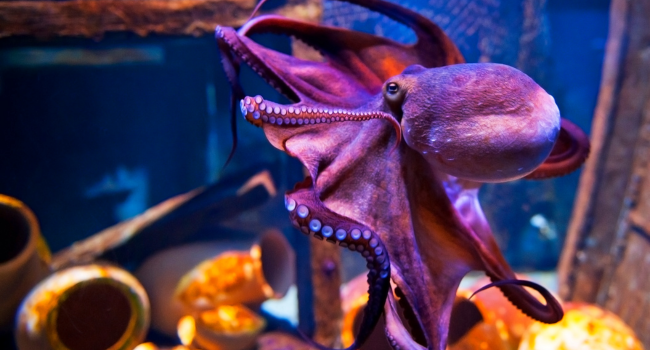
The electric eel
The Electric Eel (Electrophorus electricus) has a brain designed to produce electric shocks, which it employs for communication, hunting, and navigation in the South American continent’s deep, dark waters. The evolution of the electric eel’s brain to interact with and decipher electrical information from its surroundings is demonstrated by this particular adaption.
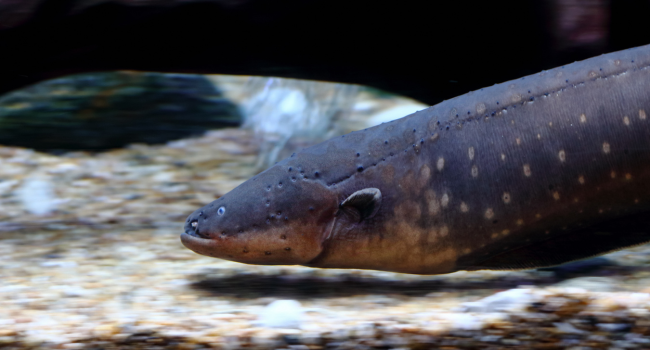
Also Read: Do Fish Have Brains?
The Cognitive Abilities of Fish
Fish, often perceived as simple creatures, possess an array of cognitive abilities that have fascinated researchers and challenged our understanding of the underwater world. Here, we will explore the cognitive capabilities of fish, including their capacity for learning and memory, problem-solving skills, and social intelligence.
Learning and Memory
Contrary to popular belief, fish are not devoid of memory and learning abilities. Numerous studies have demonstrated that fish can learn from their experiences and retain information over time.
For instance, they can remember the locations of food sources, safe habitats, and potential predators. This capacity for learning allows them to adapt to changes in their environment and make more informed decisions to improve their chances of survival.
Fish are also known to exhibit associative learning, where they can connect certain stimuli with particular outcomes. This ability allows them to learn through trial and error and adjust their behaviors accordingly. Learning and memory play crucial roles in various aspects of a fish’s life, from foraging and avoiding threats to navigating through complex underwater environments during migration.
Problem Solving
Certain fish species demonstrate impressive problem-solving skills. They can overcome challenges and obstacles in their environment by employing creative and innovative strategies. For instance, some fish use tools to extract food from hard-to-reach places, while others engage in complex hunting techniques that require coordination and planning.
An excellent example of problem-solving prowess is the Archerfish, which employs its specialized brain and mouth to shoot down insects above the water’s surface using jets of water. This behavior showcases the Archerfish’s ability to adapt its hunting strategy to suit its unique ecological niche. Such problem-solving abilities suggest that fish are more cognitively sophisticated than previously believed.
Social Intelligence
Fish exhibit varying degrees of social intelligence, showcasing complex interactions within their social groups. Many species engage in intricate communication through visual displays, sounds, and chemical cues. These interactions are essential for establishing social hierarchies, maintaining territory, and finding suitable mates.
Furthermore, some fish, such as the Cleaner Wrasse, display remarkable social intelligence by engaging in mutualistic cleaning interactions with other species. Their specialized brain enables them to identify “client” fish and “clean” them by removing parasites, displaying a high level of cooperation and understanding within their social ecosystem.
Conclusion
A wide variety of fish species can be found in the undersea environment, and many of them have extraordinary cognitive capacities. These fish put our notions of intelligence to the test in a variety of ways, from collaboration and communication to problem-solving and tool use. Understanding these amazing organisms helps us understand the intricacy and mystery of life below the waters.
In addition to shedding light on the intriguing realm of fish cognition, research on fish brains offers important insights on the evolution of brains in various species, including humans. Scientists can better understand fundamental brain functions shared by all vertebrates by studying the neural systems and cognitive processes in fish.
To learn more, visit Crzypetclub.com
